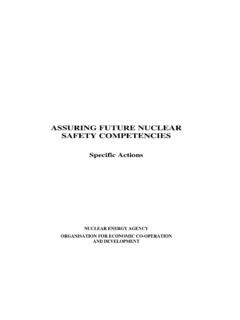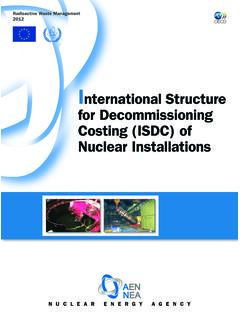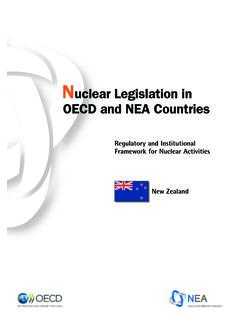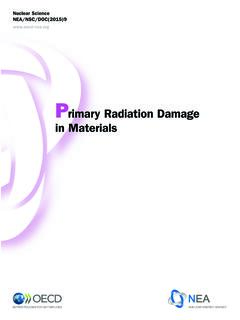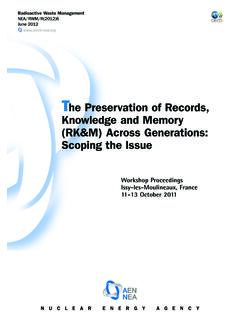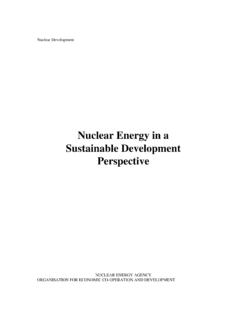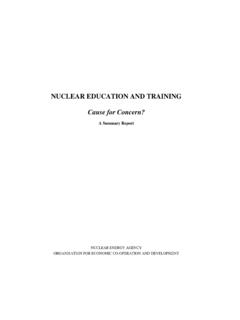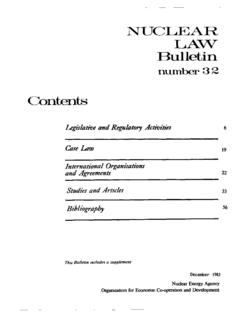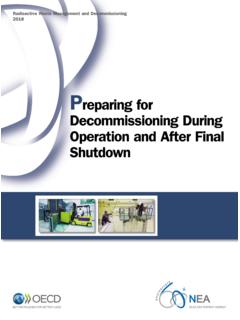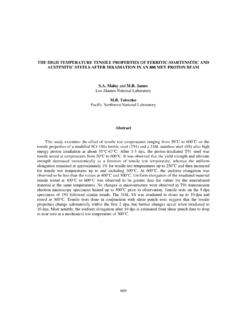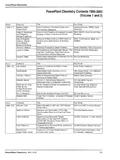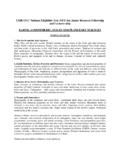Transcription of The Full Costs of Electricity Provision - oecd-nea.org
1 The Full Costs of Electricity ProvisionThe Full Costs of Electricity ProvisionNuclear Technology Development and Economics The Full Costs of Electricity Provision OECD 2018 NEA No. 7298 NUCLEAR ENERGY AGENCY ORGANISATION FOR ECONOMIC CO-OPERATION AND DEVELOPMENT ORGANISATION FOR ECONOMIC CO-OPERATION AND DEVELOPMENT The OECD is a unique forum where the governments of 35 democracies work together to address the economic, social and environmental challenges of globalisation. The OECD is also at the forefront of efforts to understand and to help governments respond to new developments and concerns, such as corporate governance, the information economy and the challenges of an ageing population. The Organisation provides a setting where governments can compare policy experiences, seek answers to common problems, identify good practice and work to co-ordinate domestic and international policies. The OECD member countries are: Australia, Austria, Belgium, Canada, Chile, the Czech Republic, Denmark, Estonia, Finland, France, Germany, Greece, Hungary, Iceland, Ireland, Israel, Italy, Japan, Korea, Latvia, Luxembourg, Mexico, the Netherlands, New Zealand, Norway, Poland, Portugal, the Slovak Republic, Slovenia, Spain, Sweden, Switzerland, Turkey, the United Kingdom and the United States.
2 The European Commission takes part in the work of the OECD. OECD Publishing disseminates widely the results of the Organisation s statistics gathering and research on economic, social and environmental issues, as well as the conventions, guidelines and standards agreed by its members. This work is published on the responsibility of the Secretary-General of the OECD. The opinions expressed and arguments employed herein do not necessarily reflect the official views of the Organisation or of the governments of its member ENERGY AGENCY The OECD Nuclear Energy Agency (NEA) was established on 1 February 1958. Current NEA membership consists of 33 countries: Argentina, Australia, Austria, Belgium, Canada, the Czech Republic, Denmark, Finland, France, Germany, Greece, Hungary, Iceland, Ireland, Italy, Japan, Korea, Luxembourg, Mexico, the Netherlands, Norway, Poland, Portugal, Romania, Russia, the Slovak Republic, Slovenia, Spain, Sweden, Switzerland, Turkey, the United Kingdom and the United States.
3 The European Commission and the International Atomic Energy Agency also take part in the work of the Agency. The mission of the NEA is: to assist its member countries in maintaining and further developing, through internationalco-operation, the scientific, technological and legal bases required for a safe, environmentally soundand economical use of nuclear energy for peaceful purposes; to provide authoritative assessments and to forge common understandings on key issues as input togovernment decisions on nuclear energy policy and to broader OECD analyses in areas such asenergy and the sustainable development of low-carbon areas of competence of the NEA include the safety and regulation of nuclear activities, radioactive waste management, radiological protection, nuclear science, economic and technical analyses of the nuclear fuel cycle, nuclear law and liability, and public information. The NEA Data Bank provides nuclear data and computer program services for participating countries.
4 This document, as well as any data and map included herein, are without prejudice to the status of or sovereignty over any territory, to the delimitation of international frontiers and boundaries and to the name of any territory, city or area. Corrigenda to OECD publications may be found online at: OECD 2018 You can copy, download or print OECD content for your own use, and you can include excerpts from OECD publications, databases and multimedia products in your own documents, presentations, blogs, websites and teaching materials, provided that suitable acknowledgement of the OECD as source and copyright owner is given. All requests for public or commercial use and translation rights should be submitted to Requests for permission to photocopy portions of this material for public or commercial use shall be addressed directly to the Copyright Clearance Center (CCC) at or the Centre fran ais d'exploitation du droit de copie (CFC) Cover photos: City panorama (Shutterstock, De Panimoni); Aerial view of Paris at night (Shutterstock, Luciano Mortula LGM); Antarctic melting glacier in a global warming environment (Shutterstock, Bernhard Staehli); European Parliament Assembly Room (Shutterstock, De Bangkruayan).
5 THE FULL Costs OF Electricity Provision , NEA No. 7298, OECD 20183 Foreword Electricity production, transport and consumption affect every facet of life in the advanced market economies of countries making up the Nuclear Energy Agency (NEA) and Organisation of Economic Co-operation and Development (OECD). Market prices and production Costs account for an important share of the overall economic impacts of Electricity . However, over at least the past two decades, there has been a growing recognition that this market value of Electricity is not the whole story and that the social and environmental impacts of Electricity Provision are affecting individuals, economies and societies in ways that are not captured in market prices, but yet are too important to be neglected. Concerns about anthropogenic climate change have strongly reinforced such a stance. In addition, the impacts of local pollution from Electricity generation on health and longevity, or the fear of major accidents on lives and ecosystems, have troubled policy makers and the public for many years.
6 Employment and technological developments are additional issues. Such impacts are called external effects, externalities or social Costs . While not reflected in market prices, researchers can nevertheless fairly well identify the external impacts of Electricity generation and Provision , often measuring them and sometimes even monetising them partially or tentatively. The full Costs of the Electricity generated by a given technology are thus the sum of the technology s private, market-based Costs plus its social Costs . Since at least the early 1990s, when a raft of major studies on energy externalities was launched, accounting for the full Costs has become part of the work of a large constituency of researchers. Suddenly, public attention moved away from the full Costs of Electricity , partly because of concerns about climate change with its particular processes and methodological conventions.
7 However, the issues associated with externalities did not disappear. One particularly stark example is provided by the World Health Organization (WHO), whose research indicates that globally, every year three million deaths are caused by ambient air pollution and by particulate matter released mainly through the burning of coal or biomass. Add to this the impact of household air pollution, much of which could be avoided by the Provision of clean Electricity , and the number of deaths per year rises to over seven million. Clearly, all sources of Electricity have advantages and drawbacks. However, it would be wrong to think that no distinctions should be made in terms of social Costs , and the present report highlights the most important ones. Despite the evident importance of full Costs , accounting for them remains difficult. From researching biophysical dose-response function, calibrating dispersion models and probabilistic assessments to the contentious issue of monetary valuation, different groups of experts need to be co-ordinated in large-scale multi-year efforts to arrive at robust results.
8 Such a large, systematic effort is, however, beyond the scope of this report. Nevertheless, the issue is too important to be disregarded any longer. The NEA has therefore decided to produce the present study on the Full Costs of Electricity Provision in order to summarise and synthesise the most recent research in this area. That an agency dedicated to nuclear energy would decide to publish a report on the full Costs of Electricity Provision including all major generation technologies may easily invite questions about even-handedness. However, the authors of this report have shown a strong commitment to synthesising well-documented information from a wide range of FOREWORD 4 THE FULL Costs OF Electricity Provision , NEA No. 7298, OECD 2018sources. Such questions should, more importantly, be a starting point for more comprehensive research on the full Costs of Electricity Provision , supported by a broad range of stakeholders in the Electricity sector.
9 If anything, the present report helps to identify priority areas such as limiting air pollution, reducing greenhouse gas emissions and properly allocating system Costs that warrant specific, new research. Research on the full Costs of energy and Electricity is an ongoing effort. This report highlights the importance of full cost accounting, in particular in the context of the energy transitions under way in many countries. Ideally, it will contribute to generating new and more comprehensive research in the area of the full Costs of Electricity to allow policy makers and the public to make better informed decisions along the path towards fully sustainable Electricity systems. THE FULL Costs OF Electricity Provision , NEA No. 7298, OECD 20185 Acknowledgements The Full Costs of Electricity Provision is a collaborative effort by the Nuclear Energy Agency Division of Nuclear Technology Development and Economics, under the oversight of the Working Party of Nuclear Energy Economics (WPNE) chaired by Matt Crozat and Professor Dr Alfred Voss.
10 The study has been approved by the parent committee of the WPNE, the NEA Nuclear Development Committee (NDC). Dr Jan Horst Keppler, Senior Economic Advisor at the NEA, co-ordinated the study and contributed Chapter 1 (Full Costs : Key concepts, measurement and internalisation), Chapter 4 (Climate change impacts), Chapter 5 (Air pollution, together with Karl Aspelund, Harvard University), Chapter 7 (Land-use change and natural resource depletion, together with Karl Aspelund), Chapter 8 (The security of energy and Electricity supply) as well as the policy conclusions (The policy implications of full cost accounting in the Electricity sector). Dr Geoffrey Rothwell, Principal Economist at the NEA, contributed Chapter 2 (Plant-level production Costs ) and Chapter 9 (Employment generated in the Electricity sector). Dr Marco Cometto, Nuclear Energy Analyst from the NEA, contributed Chapter 3 (Grid-level system Costs ) and Chapter 6 (The Costs of major accidents).
